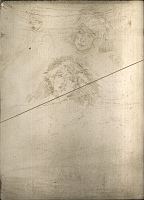Three studies of women's heads | ||
| Number: | 400 | |
| Date: | 1888 | |
| Medium: | etching and drypoint | |
| Size: | 135 x 98 mm | |
| Signed: | no | |
| Inscribed: | no | |
| Set/Publication: | no | |
| No. of States: | 1 | |
| Known impressions: | 1 | |
| Catalogues: | K.-; M.-; T.-; W.- | |
| Impressions taken from this plate (1) | ||
KEYWORD
head, portrait, woman.
TITLE
Whistler's original title is not known, so descriptive titles were given to the copper plate:
'Study of three heads' (1903/1935, possibly Rosalind Birnie Philip (1873-1958)).
'Three studies of women's heads' (2010, Whistler Etching Project).
This title 'Study of three heads' may have been recorded by Rosalind Birnie Philip (1873-1958), or by the Hunterian Art Gallery at the time of Miss Birnie Philip's gift of material from Whistler's estate to the University of Glasgow. However, 'Three studies of women's heads' is a more precise descriptive title.
'Study of three heads' (1903/1935, possibly Rosalind Birnie Philip (1873-1958)).
'Three studies of women's heads' (2010, Whistler Etching Project).
This title 'Study of three heads' may have been recorded by Rosalind Birnie Philip (1873-1958), or by the Hunterian Art Gallery at the time of Miss Birnie Philip's gift of material from Whistler's estate to the University of Glasgow. However, 'Three studies of women's heads' is a more precise descriptive title.
DESCRIPTION
At top right and in the centre are two studies of a woman's head and shoulders. She has a short fringe combed diagonally across her forehead and hair fluffed out on each side of her face. The tops of her sleeves are puffed up, or possibly trimmed with a frill or epaulette. At top left, behind these heads, is a smaller head-and-shoulders study of a young woman wearing a close-fitting bonnet, in three-quarter view to left.
SITTER
Identifying Whistler's sitters is not easy, because they sometimes have a family resemblance to each other, and to fashion types of the period. However, possible sitters for the two larger heads include Beatrice Whistler (1857-1896), or one of her sisters. One model is quite like the young woman in Woman sleeping in a chair [401].
Another possibility is Gertrude Elizabeth Campbell (Lady Colin Campbell) (1857-1911) (see Lady Colin Campbell [369]). Lady Colin varies considerably as represented in portraits of different periods and media but a photograph in the National Portrait Gallery dated to the 1890s shows a woman with facial features and hair not unlike the Whistler etching. 1
1: Anon., albumen photograph, NPG Ax21900, website at www.npg.org.uk (accessed 2011).
DISCUSSION
Why there are no extant prints of this drypoint is not clear. One possibility is that, if it does show Beatrice Whistler, the artist destroyed the images after her death in 1896.

